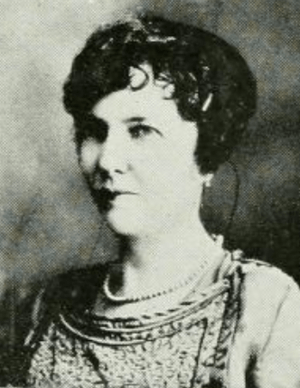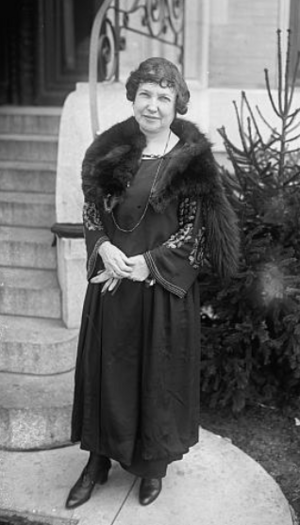Milagros Benet de Mewton facts for kids
Quick facts for kids
Milagros Benet de Mewton
|
|
|---|---|
 |
|
| Born |
Milagros Benet Colón
22 November 1868 |
| Died | 26 December 1948 (aged 80) San Juan, Puerto Rico
|
| Nationality | Puerto Rican |
| Other names | Milagros Benet de Newton |
| Occupation | teacher and suffragist |
| Years active | 1901–1940 |
| Relatives | José Benet Colón (brother) |
Milagros Benet de Mewton (born Milagros Benet Colón; 22 November 1868 – 26 December 1948) was a Puerto Rican teacher and a strong supporter of women's rights. She was also a suffragist, meaning she worked to get women the right to vote.
Milagros came from a smart and open-minded family. She became a teacher. In 1917, people in Puerto Rico became U.S. citizens. This happened after the United States took over Puerto Rico from Spain in 1898.
That same year, Milagros joined the first group fighting for women's voting rights, called the Liga Femínea Puertorriqueña. In 1919, women in the U.S. gained the right to vote with the 19th Amendment. Milagros then worked hard to make sure this right also applied to women in Puerto Rico.
In 1924, she even went to court. She argued that the election board could not stop women from registering to vote because they were U.S. citizens. However, the Supreme Court of Puerto Rico decided that states and territories could choose who votes. So, they did not agree with her.
Milagros kept fighting through another group, the Liga Social Sufragista. They tried to pass many laws, but the Puerto Rican legislature kept saying no. In 1928, she asked the U.S. Congress to fix the voting differences for women in Puerto Rico.
Because the U.S. Congress might give women the right to vote, the Puerto Rican legislature finally passed a law in 1929. This law allowed women who could read and write to vote. All women, no matter if they could read or not, finally gained the right to vote in 1936. Milagros Benet is remembered for her work in education and for helping women gain more rights in Puerto Rico.
Milagros Benet: Her Early Life
Milagros Benet Colón was born on November 22, 1868, in Cayey. At that time, Puerto Rico was part of the Spanish Empire. Her parents were Ulpiana Colón Collazo and Felix L. Benet Rivera.
Her family was important in society. Her father was a politician, and her brother, José, also served in the government. In 1898, her father passed away. That same year, the United States took control of Puerto Rico after the Spanish–American War.
After her father's death, Milagros, her mother, and her younger sister Cruz moved to Santurce in San Juan. They lived with her older sister, Ulpiana de Gordils.
In 1901, Milagros and her sister Cruz both earned their teaching certificates. Cruz became a nun, but Milagros chose to teach in schools in Ponce, Puerto Rico. In 1911, she married Herbert Edwin Mewton, who was from England.
Her Fight for Equality
In 1917, people in Puerto Rico became U.S. citizens. At that time, all men could vote. That year, a group called the Puerto Rican Feminist League (Spanish: Liga Femínea Puertorriqueña) was started by Ana Roqué. This group worked hard to get women the right to vote.
In 1919, their local senator, Antonio Rafael Barceló, would not talk about women voting. So, Milagros, Isabel Andreu de Aguilar, and María L. de Ashford went to Washington, D.C. to share their case. The 19th Amendment gave U.S. women the right to vote. However, officials said it did not apply to Puerto Rico because of the island's special status.
In 1921, the Feminist League changed its name to the Suffragist Social League (Spanish: La Liga Social Sufragista). They wanted not just voting rights, but full political rights for women. Milagros Benet became the first president of La Liga. In 1921 and 1923, they tried to pass laws for women's voting rights, but they failed.
In 1922, Milagros and Ana Teresa Paradas, one of Puerto Rico's first women lawyers, went to a meeting in Baltimore, Maryland. This meeting was called the Pan-American Conference of Women. There, Milagros spoke about how women worked in Puerto Rico.
In 1923, Milagros became the president of the Puerto Rican part of the Pan-American Women's Association. She and Mariana Morales Bernard, a leader for women workers, went to court. They wanted to see if the 19th Amendment should apply to Puerto Rico.
Milagros also sued the election board because they would not let her register to vote. She argued that as a U.S. citizen, she should be allowed to vote under the U.S. Constitution. The Supreme Court of Puerto Rico said that Puerto Rico, like U.S. states, could decide who could vote. Both court cases failed. This caused some disagreements within La Liga.
Some women in La Liga were worried that working with working-class women would spread socialism. So, a group of conservative women, led by Rosario Bellber, left the group. They started a new group called the Puerto Rican Association of Women's Suffrage (Spanish: Asociación Puertorriqueña de Mujeres Sufragistas). This new group only wanted voting rights for women who could read and write.
The other group, led by Milagros Benet, supported voting rights for all women. They held new elections for La Liga. Marta Robert was elected president, and Olivia Paoli de Braschi became vice president. Milagros Benet and others stayed in the group.
Milagros was careful about working with socialists. When she gave out forms for the Pan-American Women's Association, she quickly left the labor offices. She did not want people to think she supported socialism. In 1928, she also refused to meet with suffragists in the poor area of La Perla. She preferred a "more suitable location" in San Juan.
In 1927, La Liga pushed for a voting rights bill in Puerto Rico's legislature. The bill passed in the Senate but failed in the House. Milagros then asked the U.S. Congress to look at women's voting rights in Puerto Rico in 1928. She was surprised that some U.S. women did not want the federal government to give Puerto Rican women the right to vote.
A bill was introduced in the U.S. House of Representatives and passed in December 1928. Even though La Liga wanted all women to vote, they agreed to support voting rights for literate women first. They saw this as a step towards full voting rights.
When it seemed the U.S. Congress was ready to grant women the right to vote, Puerto Rico's legislature approved a bill on April 16, 1929. This bill allowed women who could read and write to vote. La Liga was the only group that protested this. They promised to keep fighting until all women could vote. However, the group did not do much more until it closed in the 1940s.
Milagros left her role as president of the Pan-American Women's Association in 1933. But she kept working for women and education. In 1934, she helped start the Puerto Rican Academy of History. All women in Puerto Rico finally gained the right to vote in 1936. This happened when a bill from the Socialist Party was approved.
In 1938, she was a delegate for the San Juan Teachers Union (Spanish: Unión de Maestros de San Juan). She went to a teachers' meeting in Cedar Point, Ohio. She also attended a conference in New York City in 1919 and was a special guest at a meeting in San Antonio, Texas.
Her Lasting Impact
Milagros Benet died on December 26, 1948, in San Juan, Puerto Rico. During her life, many women's groups from North and South America honored her.
Today, she is remembered for her efforts in the fight for women's right to vote in Puerto Rico. Her life shows how much she helped women gain this important right. Other working women also fought for political rights, but their focus was more on workers' rights and unions.
When Milagros, who was from an important family, filed her lawsuit against the election board, she had a lot of support. She had the backing of smart people and powerful men who believed voting was part of democracy. The voting rights case she filed is still used today as an example for voting laws in Puerto Rico.
 | Charles R. Drew |
 | Benjamin Banneker |
 | Jane C. Wright |
 | Roger Arliner Young |


